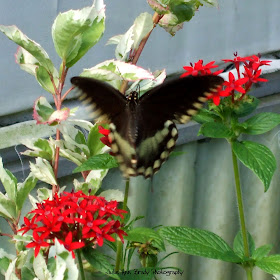The Spicebush Swallowtail Butterfly is reportedly a pretty common type of butterfly and also the most beautiful and interesting of the swallowtails. This morning at the Lake County Extension Service Discovery Gardens, I photographed my first such swallowtail.
 |
| Spicebush Swallowtail Butterfly - Discovery Gardens |
I had recently blogged about the
Eastern Black Swallowtail Butterfly and thought, at first, this might be one of them! However, as I walked around Discovery Gardens and then came back to the Butterfly House, I knew it was something different!
 |
| Spicebush Swallowtail Butterfly - Discovery Gardens |
Checking the
University of Florida, Entomology and Nematology Department, photos, it appears this butterfly is a male. The bluish color on the bottom of the wings indicates male.
 |
| Spicebush Swallowtail Butterfly - Discovery Gardens |
Looking at the body, black with white dots, that is quite similar to the Eastern Black Swallowtail.
 |
| Spicebush Swallowtail Butterfly - Discovery Gardens |
Another comparison to the
Eastern Black Swallowtail is the colored spots on the underside bottom of the wings. The Spicebush Swallowtail has an area of blue coloring instead of the spots which distinguishes it from that type of swallowtail.
 |
| Spicebush Swallowtail Butterfly - Discovery Gardens |
When it comes to mating, "both sexes will copulate with several mates during mating season. However, each time a female mates, she becomes less likely to mate again." ~
Wikipedia. "The entire development process from egg to adult takes about a month. Once they have reached the adult stage, Papilio troilus can live anywhere from two days to two weeks dependent on resource availability and predator avoidance."
Did you know that the Spicebush Swallowtail is a puddler? They will engage in puddling as an adult when flying in search of food or a mate. Flying together in groups near banks of water, they will extract moisture from the sand or soil near these banks of water.
Check out my other sightings of butterflies in Leesburg and Jacksonville, Florida:





No comments:
Post a Comment